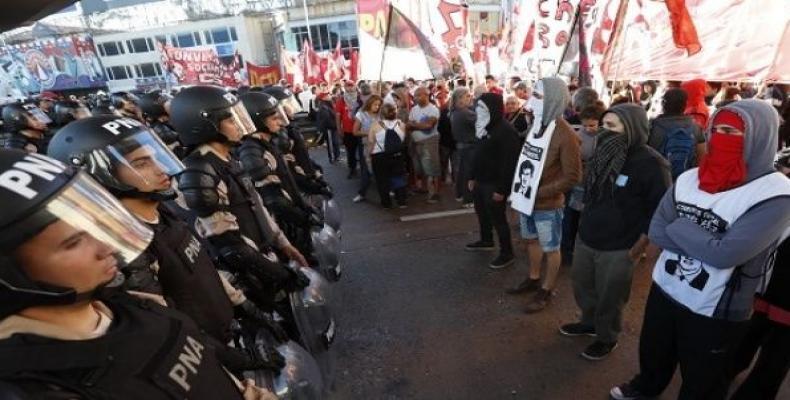Buenos Aires, April 11 (RHC)-- In the wake of a national general strike against neo-liberal policies and weeks of protests by teachers' unions across the country, Argentinean President Mauricio Macri is considering the purchase of new anti-protest equipment to ramp up the government's arsenal to crack down on social unrest in the South American country.
Days after last Thursday's general strike kicked off with riot police violently dispersing protesters blocking highways feeding into Buenos Aires, local media are reporting that Macri's government is evaluating plans to purchase new technology including sound cannons and equipment to fire sticky foam that helps immobilize protesters to allow law enforcement agents to detain them more quickly.
According to La Nacion, in the coming days the government will also be looking at "new anti-riot training techniques." Security Minister Patricia Bullrich and Secretary of Homeland Security Gerardo Milman are set to meet with the federal police force to discuss possible next steps.
Macri asked forces to redefine their strategies to remove protesters and coordinate transportation for citizens with the support of public institutions, La Nacion reported.
Other technologies authorities are considering adding to country's anti-protest arsenal include cranes to remove blockades and vehicles used to block the roads and other technology, including sonic devices that use sounds to disperse protesters.
Macri is looking over the new equipment after having to face last week the first nationwide general strike since he took office, organized to protest his government's austerity and neo-liberal shock therapy on the economy.
Hundreds of protesters blocked the Panamerican Highway and were violently evicted by police with tear gas and water cannons at the outset of the strike. At least six people were arrested and four injured.
National and international flights were canceled as well as public transportation during the 24-hour general strike, bringing a halt to activities in health, education, manufacturing, banking, garbage collection and even some government offices.
Argentina's Macri Considers Purchase of New Riot Control Weapons to Crack Down on Protests


